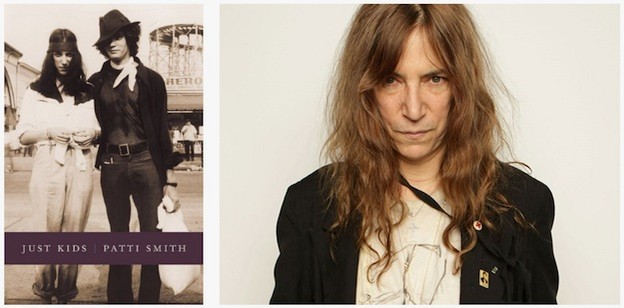A review of 'Just Kids'

Just Kids
Just Kids
Raised in a poor but loving family in New Jersey, Patti Smith wasn’t happy with the range of opportunities open to her after high school. Artistic and strong-natured — she played the General in her games with her brother and sister — she got into trouble with an unwanted pregnancy, gave the baby up for adoption, quit her factory job, and took a bus to New York.
Her memoir Just Kids is a love story, a kind of American La Boehme. Within a few weeks of her arrival in New York during the summer of 1967, she met a male counterpart, a former choirboy from a strict Catholic family from Queens, Robert Mapplethorpe. The two lived in poverty together, scrounging money for food and sleeping in borrowed apartments, before finding enough work to set up their own tiny household. At the same time, each recognized and nurtured in the other the artistic gene in its early budding.
Just Kids gives the lie to Robin Williams’s famous quip that if you remember the sixties you weren’t there. Smith remembers photographically (we learn that she didn’t do drugs) virtually every item she and Mapplethorpe wore, both of them budding style mavens. They made a pact to keep each other safe — if one was ill, intoxicated or otherwise down, the other was designated guardian. While working briefly for the Fillmore East, Mapplethorpe got her a comp ticket for a Doors concert. She writes:
I had a strange reaction watching Jim Morrison. Everyone around me seemed transfixed, but I observed his every move in a state of cold hyperawareness. I remember this feeling much more clearly than the concert. I felt, watching Jim Morrison, that I could do that. I can’t say why I thought this. I had nothing in my experience to make me think that would ever be possible, yet I harbored that conceit. I felt both kinship and contempt for him. I could feel his self-consciousness as well as his supreme confidence. He exuded a mixture of beauty and self-loathing, and mystic pain, like a West Coast Saint Sebastian. When anyone asked how the Doors were, I just said they were great. I was somewhat ashamed of how I had responded to their concert.
In 1972 Andrew Wylie, Victor Bockris, and I collaborated on a literary press, Telegraph Books, and published Smith’s first book of poems, Seventh Heaven. At a photoshoot to publicize our venture and its dozen or so writers, Smith’s fluency and ease before our photographer, Berry Berenson, startled me. While the rest of us stood around in various degrees of literary introspection, this slight woman in black stretch pants, Capezios, and an oversized tee shirt was like a cross between a street urchin and Mick Jagger, and at the same time managed to charm everybody.
Just Kids contains cameos of sixties stars including Janis Joplin, Kris Kristopherson, Jim Carroll, Viva, Bobby Neuwirth, Harry Smith, and Sam Shepard in the downtown environs centered at the Chelsea Hotel and Max’s Kansas City, but what sustains the book’s strong emotional current is Smith’s love for Mapplethorpe, even as their lives move apart. They worked side by side together — she on poetry and drawings, he on drawings and collages — and slept in one another’s arms. Smith eventually found a regular job at the venerable Scribners bookstore on Fifth Avenue.
Having discovered photography, Mapplethorpe gradually acceded to his homosexuality, eventually finding a patron and partner in Sam Wagstaff. “Patti, do you think we lost ourselves to art?” he asked her a decade later as he was dying of AIDS.
Beginning with portraits of her, he quickly evolved a high definition photograph that embraced a wide range of subject matter, from flowers to male and female nudes to portraits of celebrities, babies and children, to images of gay men, often in S&M scenarios, which brought him fame and notoriety. What all of these photographs have in common is that each is scrupulously posed and lit. He also did sexual self-portraits in both macho and femme personae. Coming after Diane Arbus and a contemporary of Nan Goldin, he combined their gritty adventurousness with an artfulness that recalls Irving Penn. Long a painter and collagist, he seemed to attain mastery virtually overnight in his new medium.
More or less in tandem with him, Patti Smith achieved punk rock stardom, married a fellow musician, the late Fred Sonic Smith, and the two raised a family in Detroit.
The firsthand accounts of the 1960s have been surprisingly few. Two writers, both a decade older than the young who created the epoch, have been the dominant popular commentators, Joan Didion (Slouching Toward Bethlehem, The White Album) and Tom Wolfe (The Electric Kool-Aid Acid Test). Just Kids, written in the retrospect of Patti Smith’s own sixties, changes that. She was there.